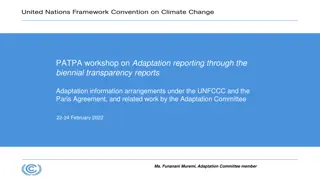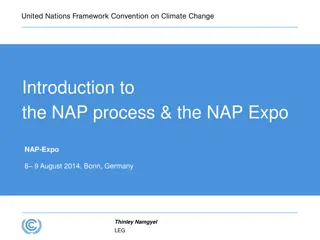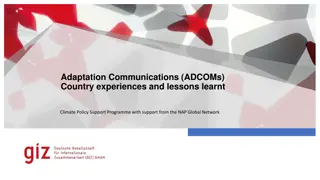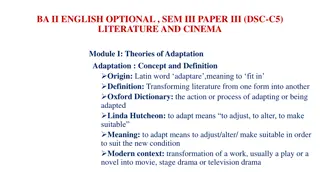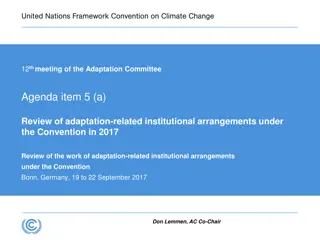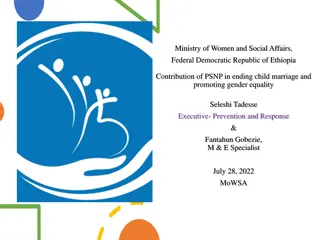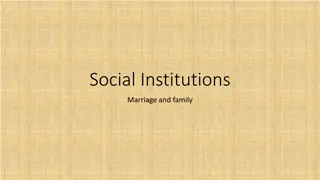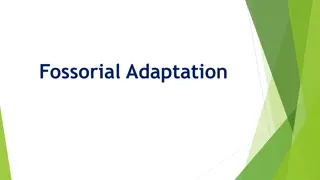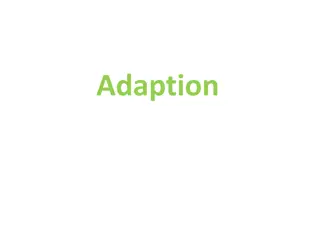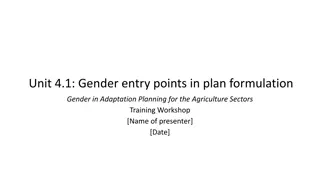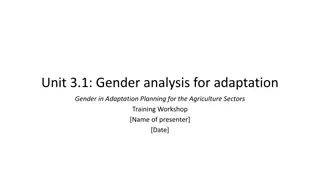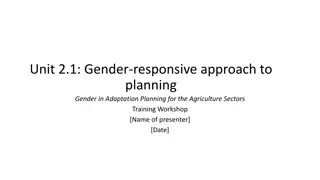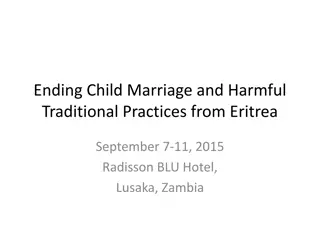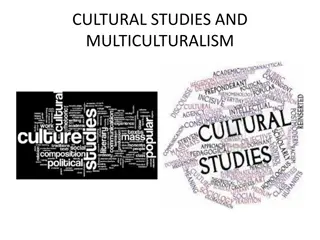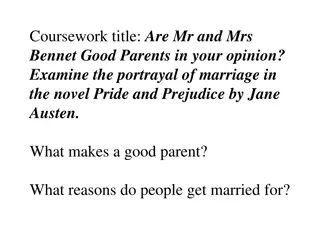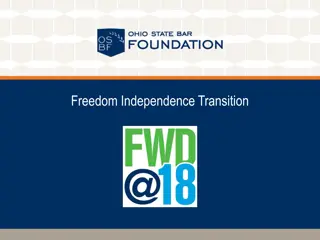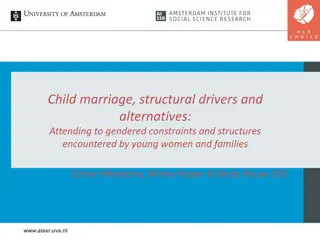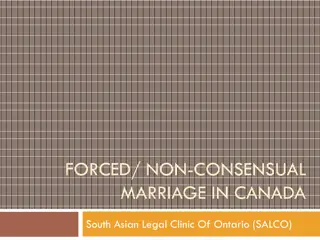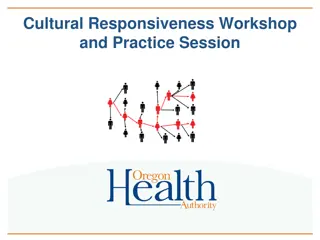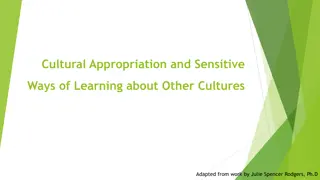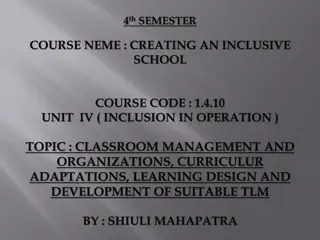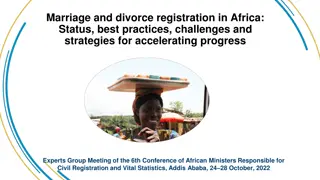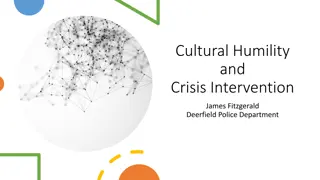Cultural Adaptation Challenges in "The Arrangers of Marriage" by Chimamanda Ngozi Adichie
Chinaza, a Nigerian woman, faces cultural adjustments in her new life in Brooklyn with her husband, Dave. The story explores themes of identity, gender roles, and immigration experiences as Chinaza navigates American customs and expectations while battling feelings of displacement and unfulfilled aspirations.
Download Presentation

Please find below an Image/Link to download the presentation.
The content on the website is provided AS IS for your information and personal use only. It may not be sold, licensed, or shared on other websites without obtaining consent from the author. Download presentation by click this link. If you encounter any issues during the download, it is possible that the publisher has removed the file from their server.
E N D
Presentation Transcript
The Arrangers of Marriage Chimamanda Ngozi Adichie Chimamanda Ngozi Adichie Content of the short story Reflection/Criticism
Chimamanda Ngozi Adichie Born 1977 in Enugu, Nigeria "Nigerian feminist writer" Published articles, books, short stories, gave speeches on feminism and the role of women especially in the context of Nigeria Famous work: "Purple Hibiscus" (novel), "We Should All Be Feminists" (speech)
Summary Chinaza, a young Nigerian woman, orphaned and raised by her Aunty Ada and Uncle Ike, goes to her new husband's home, a hot, shoddy, barely furnished apartment in Brooklyn, New York, not the imposing house she envisioned. Tired after the long flight from Lagos, she hopes not to have to perform "wifely duties," meaning sex. She needn't worry, for her husband starts snoring. After he initiates sex the next morning, she calls her aunt and uncle. They were happy to have found Chinaza an American doctor in a short time. Although they did their familial duty, they never taught Chinaza to be anything but submissive and never encouraged her to further her education, which she had wanted to do. "It is like we won a lottery for you!" her aunt said. Chinaza is relieved the line is busy when she calls. When she tells her husband it is "engaged," he informs her Americans say "busy," not engaged. He also tells her Americans don't drink tea with milk and sugar. Shirley, an elderly neighbor, brings the mail she has saved. She calls Chinaza's husband "Dave," though she knows his real name is Ofodile Emeka Udenwa. He calls himself Dave Bell because Americans can't pronounce his name and advises Chinaza to get her Social Security card under her Christian name, Agatha Bell. She's upset, but he says, "You'll get used to it, baby." She is annoyed by many things about Dave, such as his snoring and the way he eats.
He takes her out, showing her how to use the bus. When they go shopping, he informs her Americans call biscuits "cookies" and instructs her to buy the store brand to save money until he becomes an attending physician. When they go to the mall for pizza, she doesn't like the way the tomatoes are cooked, not like Nigeria. He buys her a coat because it will be cold in the winter. When they go out to McDonald's for dinner, Chinaza is disappointed because her aunt told her to cook. On Monday, when she makes coconut rice, Shirley comes over and comments that it smells good. The next day, her husband buys Chinaza a Good Housekeeping cookbook so she can make American food. He wants to be American, not foreign, but Chinaza has a hard time learning to cook the way Americans do. One day, Chinaza meets a neighbor, Nia, a hairdresser. She's friendly and likes Chinaza's African name better than Agatha. Nia says her own name is Swahili, having changed it from her given name when she was 18. She says she can help Chinaza get a job at Macy's when she gets her work permit. The two women become friends, but Dave says Nia will be a bad influence.
Winter comes. Chinaza speaks only English to Dave. It is snowing, and Chinaza asks when she'll get her work permit. At that moment Dave reveals to her the American woman he married to get his green card is giving him a hard time. Their divorce was almost final when he married Chinaza in Nigeria. Now the woman is threatening to report Dave to immigration. This is the first Chinaza has heard about another wife. Dave says he was going to tell her. She says she deserved to know. He says, "With the way things are messed up back home, what would you have done?" After all, in Nigeria, people with master's degrees can't get jobs. She asks why he married her. He says he wanted a light-skinned Nigerian woman, and his mother thought she might be a virgin. Chinaza packs only the clothes she brought and goes to Nia's apartment. When she tells Nia the whole story, Nia asks what her aunt and uncle will do. Chinaza knows they will tell her to stay. Chinaza asks if Nia knew the woman he married or any women he dated. Nia admits she had sex with him but never saw him date anyone. Nia suggests Chinaza wait until she gets her papers and then leave. She can apply for benefits and get a job to support herself. Chinaza realizes Nia is right. She can't leave yet. She goes back to her apartment and rings the doorbell. Dave lets her in and lets her pass.
Analysis As with "The Thing Around Your Neck," this story deals with disillusionment in the American dream. In "The Thing Around Your Neck," Akunna's friends and family assumed she would have a house and a car as soon as she got to America, but she has neither. Rather, she gets sexually assaulted and can't afford to go to college. In "The Arrangers of Marriage" Chinaza, too, has material goals in mind, for she has heard doctors in America are rich, but her husband has not yet completed his training and makes very little. More important, however, he is unattractive to her, annoying, constantly correcting her, and telling her what to do to assimilate: speak English, cook American, use English names. She'll get used to it, he says. This comment echoes Akunna's uncle's statement that everything in America is a trade-off. However, Chinaza assumes she is trading her culture, her language, and her name for marriage to a man who at least is truthful with her. When he is not, his lie is a question of legality, and she is in a dilemma. The themes of women's roles and lack of choices surface in this story. Although not by her own wishes, Chinaza isn't educated, so she has fewer opportunities than someone who is. However, as Dave points out, even people with master's degrees can't get jobs in Nigeria. Therefore, she is left without meaningful choices both in beginning her marriage and in ending it. In something of a compromise, she decides to stay with Dave until she can work. But because her marriage to Dave isn't legal, she may never get her green card, or it could be years before he can divorce the other woman and legally marry Chineza, who only then could get her work permit.
Nevertheless, Chinaza may be better off in the United States than in Nigeria. She must think so, at least. She has no loving family in Nigeria and no job prospects. Here, at least, she is being supported and, presumably, Dave will deal with his legal problems. Further, despite his demands for her assimilation, he has not been actively unkind, and eventually she will probably stay and find work. Still, the reader may question whether Chinaza will actually leave her husband. In contrast to Akunna in "The Thing Around Your Neck," who immediately stands up for herself in the face of a man who treated her poorly, Chinaza seems resigned to her situation and may become complacent, for she is not a fighter. Indeed, her constant submission to Dave's demands indicates she will continue to follow his orders. While Chinaza accepts her situation, it seems harder for Dave to do so. Despite his attempts to fit into American life, he doesn't seem to be successful. Shirley, it appears, is friendly to him because he does things for her. Yet she acts condescending about the food Chinaza makes. According to Nia, he had no attachments before Chinaza. Thus, Dave, like Chinaza, has a limited number of choices. Racism, too, surfaces briefly as a theme. Dave wanted to marry Chinaza because she is light- skinned and hopes their children will be light-skinned. Light-skinned black people are treated better.
The Arrangers of Marriage Chinaza comes to the U.S. to live with her husband Ofodile The marriage was arranged Her husband is rude, the atmosphere is unwelcoming ("The room was hot, old, musty smells hung heavy in the air.") First days in the U.S. her husband wants to make sure that she adapts to the "American culture" Chinaza becomes friends with Afro-American neighbor Nia Chinaza finds out that her husband is already married, stays with Nia for a few days Decides to stay with her husband for some more time until she gets her work permit "[...] she, a black American, had chosen an African name, while my husband made me change mine to an English one"
Diaspora What is Diaspora? "[...] William Safran applies the concept of diaspora to expatriate communities which a) have been dispersed from a centre to foreign regions [...], c) believe they re not accepted by their host society" Cohen: "[...] diaspora also involves a) departure from the homeland in search of work, trade or further colonial ambitions, b) a sense of empathy and solidarity with people from the countries of settlement [...]"
African Diaspora "[...] the existence of communities of peoples of African descent across the globe who experienced and continue to experience broadly similar problems and who share broadly similar cultural characteristics." (Palmer, page 57)
migration vs. diaspora Migration: movement of a particular people from one point to another inside a polity or outside of it Diasporic stream: movement of a people to several destinations at once or over time (Palmer, p. 57)
Fictional Representations of Contemporary Diasporas: The Case of the Invisible Diasporic Women of Chimamanda Ngozi Adichie women protagonists like Chinaza are "diasporic subjects" defined by "a traversal of the boundaries demarcating nation and diaspora" because of the situation in Nigeria (lack of jobs, inequality of sexes, lack of university opportunities women like Chinaza hope to find a better life in the U.S. Chinaza s family expects great gratitude, she ignores her own wishes and marries a Nigerian medicine student who lives in the U.S
Chinaza is paralyzed by a cultural shock: her husband thinks the only way to succeed in the society is by erasing everything that comes from their homeland Nigeria Language is a big part of diasporic studies: Chinaza has to forget her Nigerian accent and is forced to speak standard English "[...] members of a diaspora usually face the expectation that the ought to accept the local language and adapt to it" (Landau) Language as a tool for Ofodile to control Chinaza s voice
"The state of invisibility and disrespect is not seldom part of a scenario that disregards diasporic minorities" (p.4) - hierarchy: diasporic women are even below narrative technique: stream of consciousness -> readers learn about conflicts as they become a part of the protagonist s mind.
Protagonist evidences how the diasporic subject cannot just be seen as "a compound of separate, constructed national identities". -> Diaspora is made of "networks of transnational identifications encompassing imagined and encountered communities". Nigerian characters in Adichie s fiction try to find a balance between homeland and hostland. "[...] transational identification is made harder by the invisibility that arises from gender and race affiliations"
Diasporic aspect (struggle to fit in, culture conflict etc.): but: Feminist approach The role and use of language
Feminist Approach "They have ambiguous recollections of Nigeria: on the one hand, Nigeria lacks jobs, university opportunities and equality between sexes [...]" (p. 2) "My husband woke me up by settling his heavy body on top of mine. "Ofodile s assimilationist attitude overwhelms Chinaza: standard English has to replace her Nigerian English accent and vocabulary [...]. In effect, anxiety regarding language is at the core of diaspora studies." (p.4)
Feminist Approach "It s an elevator, not a lift. Americans say elevator." "Okay." He led me to the lift (elevator) [...] "Pitcher. Americans say pitcher, not jug." I pushed the jug (pitcher) across.
She leaves him, but does come back - just because she is clever enough to know that she needs the work permit first "Adichie reveals her stakes in African feminism in the beginning of the story, when Chinaza does not blame Ofodile for his behavior, but instead blames "the arrangers of marriage". [...] accuses patriarchy of setting up the system which Ofodile is a part of" (Alexander, p.23)
Thought: How long can one be considered as a "diasporic subject?" "[...] she, a black American, had chosen an African name, while my husband made me change mine to an English one How long, do you think, can people be influenced by their diasporic background? Which factors support the "invisibility" of diasporic people?
Sources Adichie, Chimamanda Ngozi, "The Arrangers of Marriage", taken from The Thing Around Your Neck, London, Fourth Estate, 2009 (pages 167- 186) Alexander, Katie, "Lived Experiences of Male and Female Hybridity Within Chimamanda Ngozi Adichie s Diaspora", University Honors in Literature, 2013 (pages 23-29) Braga, Claudio & Goncalves, Glaucia R., "Fictional Representations of Contemporary Diasporas: The Case of Invisible Diasporic Women of Chimamanda Ngozi Adichie", Link: http://www.inter-disciplinary.net/at-the-interface/wp- content/uploads/2014/05/Braga-and-Gon%C3%A7alves-dias7-dpaper.pdf Palmer, Colin, "The African Diaspora", taken from The Black Scholar, Vol. 30, No. 3/4, Transcending Traditions, Taylor& Francis, Ltd. 2000 (pages 56-59)



